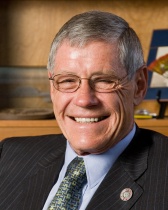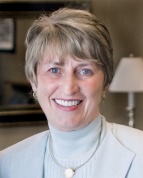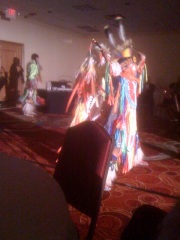2010 ACUPCC Climate Leadership Summit Facilitates Dialogue and Engagement
By Steve Muzzy, Senior Associate, Second Nature
(This article appears in the November, 2010 issue of The ACUPCC Implementer)
The 4th Annual American College & University Presidents’ Climate Commitment (ACUPCC) Climate Leadership Summit met October 12-13 in Denver, CO. The nearly 200 participants got right to work sharing challenges and best practices and outlining the future direction of the commitment. Highlights from the Summit follow.
 James Woolsey, former Director of the Central Intelligence Agency under President Bill Clinton, provided the opening keynote address. Mr. Woolsey’s presentation focused on the impending threats to national security that are being posed by an increasingly unstable climate. His perspective creatively threaded the current and future social and environmental implications of our reigning energy policy as well as provided some promising existing mechanisms to scale renewable energy production. Note: Mr. Woolsey’s presentation and all Summit presentations will be available on the ACUPCC website soon.
James Woolsey, former Director of the Central Intelligence Agency under President Bill Clinton, provided the opening keynote address. Mr. Woolsey’s presentation focused on the impending threats to national security that are being posed by an increasingly unstable climate. His perspective creatively threaded the current and future social and environmental implications of our reigning energy policy as well as provided some promising existing mechanisms to scale renewable energy production. Note: Mr. Woolsey’s presentation and all Summit presentations will be available on the ACUPCC website soon.
- Read more about 2010 ACUPCC Climate Leadership Summit Facilitates Dialogue and Engagement
- Add new comment


![DC logo.red[2]](http://secondnaturebos.files.wordpress.com/2010/09/dc-logo-red2.jpg?w=180&h=180)










 Second Nature’s
Second Nature’s  College and university students across the world - but particularly those in the US, China, and India - are gearing up for some friendly competition to save the world.
College and university students across the world - but particularly those in the US, China, and India - are gearing up for some friendly competition to save the world. Four groups -
Four groups - 
 Later on this year, teams will earn points by implementing projects that promote clean energy and reduce greenhouse gas emissions. This is a critical year for ramping up action to avoid the worst impacts of climate disruption, so get involved - and good luck!
Later on this year, teams will earn points by implementing projects that promote clean energy and reduce greenhouse gas emissions. This is a critical year for ramping up action to avoid the worst impacts of climate disruption, so get involved - and good luck!

 On April 23, the
On April 23, the